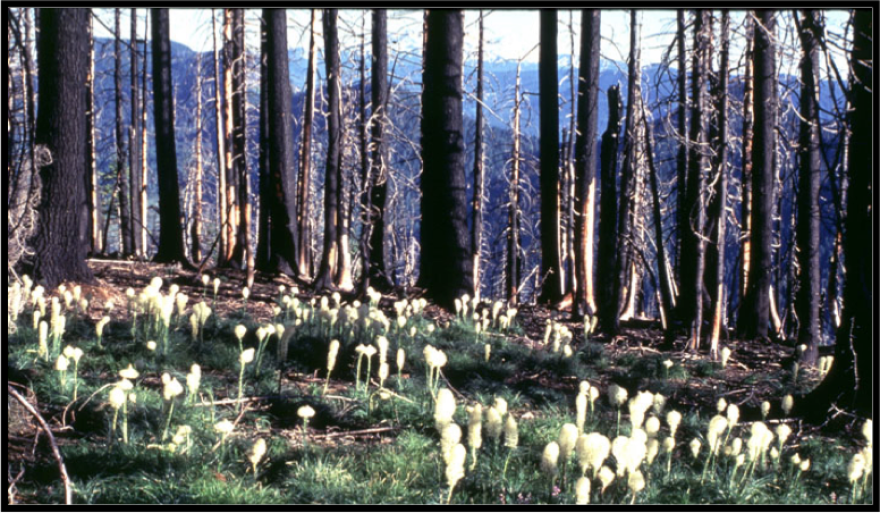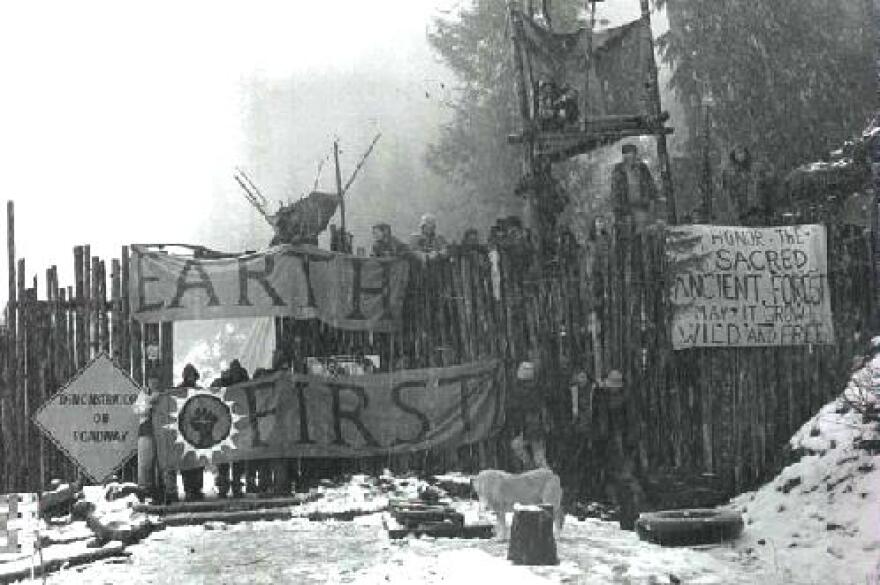It's been 20 years since environmental activists set up a blockade on a forest service road near Oakridge to prevent logging in the Warner Creek watershed in the Willamette National Forest. Timothy Inglesbee is director of Firefighters United for Safety Ethics and Ecology. He remembers the events, which started with fire.
Inglesbee: "The fire was ignited by arsonists in October of 1991. And they started the fire in what's called the Cornpatch Roadless Area. It was one of the first habitat reserves which was set up for the Northern Spotted Owl, which was headed for extinction from old-growth clear-cutting and in this area, logging was prohibited. Well, the smoke hadn’t even cleared when the Willamette National Forest said, hmm, these trees are dead, so they're no longer good for owls but they're plenty valuable for lumber. And they proposed a salvage timber sale. That started about a 5 year campaign to stop the timber sale."
Inglesbee says in 1995 federal magistrate Thomas Coffin agreed with environmental groups and suspended salvage logging in Warner Creek.
Inglesbee: "After Judge Coffin issued his ruling and said, you know, Forest Service, this is an illegal timber sale, Judge Hogan kind of sat on that ruling until Congress passed the Salvage Logging Rider and that basically suspended all laws governing logging in a national forest for about a year and a half. It set up sort of a regime of lawless logging."
When did activists go up and block the logging road?
That was very exciting. Basically, right after Judge Hogan threw out the court ruling, negated that, activists left the courtroom and headed up to the forest right there and there they sat, basically at a locked gate that the Forest Service had set up to keep people out of the timber sale area, and they just sat there. And they sat there for almost 360 days through the winter, 8 feet of snow, continuous vigil, kind of non-violent, direct action, blocking the road from the Forest Service and loggers. It was really a remarkable feat. The longest running blockade of a timber sale in U.S. history up to that point."
In the summer of 1996, the Forest Service broke up the activists' blockade. Several protesters were arrested. The salvage logging project was cancelled.
Inglesbee says in the 24 years since the Warner Creek Fire, the forest is thriving.
Inglesbee: "The new trees are a dozen feet tall or more. It's incredible diversity. All native plants. Unlike some of the burned clearcuts that are full of weeds, invasive plants. This is all native plants. It's really one of the best kept secrets in the Forest Service and they really, they don't, aggressive management is not needed to recover forests from fires. It's part of the natural cycle. There's herds of elk and deer, owls of course, bear, coyote."

We're experiencing wildfire season right now in the west. And hearing about these fires that are being battled aggressively and a lot of that is to protect people's homes. What do you see in terms of how the experience of Warner Creek and seeing it recover might teach us a different way to approach wildfires?
Inglesbee: "That's an excellent question. About 2,500 firefighters battled the Warner Creek fire. We spent $10 million. And, basically, it was the winter snow put out the fire. The fire itself defined it's own boundaries. When the conditions are right for large wildfires, they'll burn until conditions change then they kind of put themselves to bed. We absolutely need fire protection, fire suppression to protect homes and communities but what are we doing battling blazes, fighting fires, really making war on wildlands in these back country areas? And we didn’t really save anything. In fact, when the Forest Service said, all these trees that you firefighters saved, we're now going to clearcut, that also brings up issues. What are we doing spending lots of money, putting young lives at risk and in many cases doing more harm than good? We should be more selective, strategic. Where do we really need to fight fires? Near homes and communities that cannot burn and avoid those backcountry wildland areas that really need to burn."
Starting Friday, there's a celebration of the anniversary of Warner Creek. There's a film screening of documentaries about the blockade at the Boreal in Eugene. Saturday and Sunday, people can head up to Warner Creek for tours and a campout.
Warner Creek 20th Anniversary Facebook Page
Directions to the Warner Creek Gathering (best route for passenger cars):
From Dink’s market (the last beer stop at the East end of Oakridge) drive 6 miles East on Hiway 58 then turn Left onto FS Rd. 5871 (sign marked “Kwiskwis Butte Road”). Take Rd. 5871 until you get to Rd. 2408, staying on the best gravel road from this point on. The route is flagged with pink ribbon at each of the intersections that might be confusing. Drive with caution for rocks and potholes in road, and look out for oncoming traffic around blind corners.
At 1.3 miles take the Left fork (follow the pink ribbon).
At 2.9 miles take the Left fork (this is the junction with Rd. 5877, the Warner Creek Road.
At 4.4 miles take the Left fork (this is one of the trailheads for the Eugene-to-Crest Trail).
At 4.8 miles take the Left fork (junction with Rd. 334).
At 5.3 miles take Right fork (junction with Rd. 337).
At 7.8 miles turn Right onto FS Rd. 2408. It’s approximately 7 miles to the campsite from here.
At 11.3 miles take the Right fork (junction with Rd. 280, the “back route” to the Kelsey Creek Rd. 2418 and the Salmon Creek Rd. 24)
At 13.2 miles this is the site of the famous Cascadia Free State blockade (look for the double pink ribbon). Stop and smell the freedom!
At 15.1 miles turn Right onto Rd. 286, head uphill and get directions for parking—you’ve arrived!
Remember, when in doubt follow the pink ribbon.
(Directions provided by Timothy Inglesbee.)






